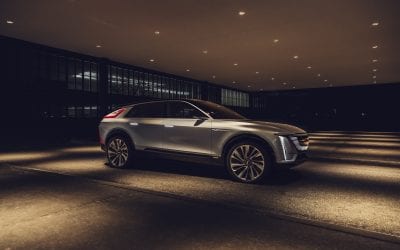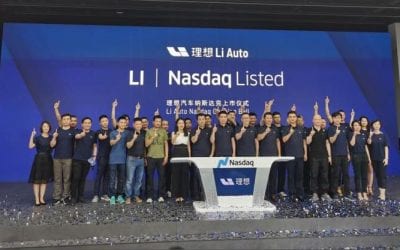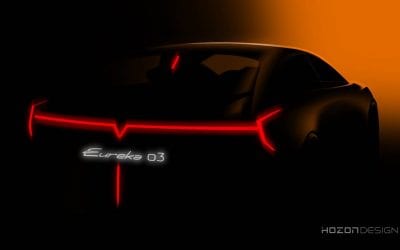
Daimler Electric Vehicles
|
Daimler, one of the early investors in Tesla has been credited by Elon Musk that it saved Tesla from bankruptcy in 2009 when it invested $50 million for a 9% stake in the electric vehicle manufacturer. Daimler has for years been developing from an automobile manufacturer into a mobility provider. The focus is no longer solely on the car as a product, but also on services related to mobility. Electric- and plug-in vehicles, for example, include an MB Wallbox installation service, and also exclusive Mercedes me connect functions. Another aspect of the corporate strategy is to offer new, innovative services for flexible and networked mobility. Moovel provides the fastest connection between two places, taking all means of transport into consideration. Daimler has a very progressive EV strategy, creating an EV specific brand in China and Internationally, Denza and EQ. The Group plans to invest over $11 billion in the sector by 2022. Read more on the Daimler EV strategy in our blog post – Daimler EV strategy trumps BMW. |
Daimler Marque EV brands
Daimler Electric Car Strategy in the news
2018 Week 47 Daimler to share smart SUV platform with Mercedes
Rumors abound that Daimler will develop the smart
EV SUV and that it will share the platform with Mercedes. The smart SUV
EV could reach the market as early as 2019 and is said to maintain many
of the features of the smart ForStars Concept shown here.

2018 Week 32 Daimler looking to build smart EV in China
Unconfirmed reports this week claimed that Daimler and BJEV are in talks
to build the smart ED in China to benefit from the demand for A0 class
EVs and combat the impact of the tariff wars.
2018 Week 30 Daimler ups its EV battery production capacity
Reuters reported that Daimler would
add two more battery lines to its battery manufacturing capacity spread
over three continents. The German automaker budgeted $1.75 billion to
upgrade and tool its EV and A-EV (autonomous electric vehicles)
manufacturing capabilities.
Daimler has completed one battery line in Kamenz and is busy building a second at the location. In Asia Daimler is constructing a plant in Beijing and in Bangkok and North America it is building a plant in Alabama.

2018 Week 24 Daimler suspends Fuel Cell program
Now that the shift towards electric mobility is gathering pace
automakers are forced to rethink their fuel cell electric vehicle (FCEV)
strategy. Reuters reported this week that the Canadian JV between Daimler and Ford
for the development of automotive fuel cell technology, Automotive Fuel
Cell Cooperation Corp, based in Burnaby, British Columbia would be
terminated this summer. Both companies will take their FCEV research
in-house. Only a few automakers have extensive fuel cell strategies, Toyota being the most prominent, doubling down on efforts to mass produce FCEVs. Honda and GM are still collaborating on the development of FCEV technologies.
2018 Week 23 Daimler has largest range of electric commercial vehicles
Daimler unveiled two more electric trucks for the North Amercian market during its Capital Markets and Technology Days in Oregon this week, claiming that it now has the largest selection of electric delivery vehicles. Maybe now is to strong a word since these models will all only be available in volume form 2021. The company will test 30 of its new Freightliner eCascadia Semi and Freightlines eM2 106 medium delivery trucks over the next year. Follow the links below to see how Daimler will come head to head with the Tesla Semi.
With the two eFreightliners, the Mercedes-Benz eActros, the light FUSO eCanter, the fully-electric Mercedes-Benz Citaro city bus and the Thomas Built Saf-T Liner C2 Jouley school bus, Daimler Trucks & Buses already has the broadest portfolio of fully-electric commercial vehicles to be found anywhere.

2018 Week 9 Confusion and Concern after Geely buys Daimler share
The Chinese auto sector is getting ever confusing after this weeks announcement that Geely‘s owner Li Shufu, one of China’s top 10 billionaires, amassed a 10% stake in Daimler,
making him the single largest shareholder in one of Germany’s crown
jewels. The transaction comes shortly after Daimler’s approval to
acquire around 5% in Geely competitor BAIC BJEV, Daimlers partner to develop electric vehicles in China. Daimler is also a JV shareholder with BYD in the EV manufacturer Denza.
Geely already owns Volvo which competes with Mercedes on passenger
vehicles and trucks.
The reasoning behind the acquisition in Daimler by Li Shufu is to force an alliance on the development of electric and self-driving vehicles and to gain access to Daimler’s technology. The acquisition by Geely in Daimler could very well put pressure on the German company’s partnership with BAIC. Volvo Trucks dropped the chief executive of Geely’s Volvo Cars from its board within a day from the announcement. The Swedish truckmaker cites competition concerns with rival Daimler as the reason behind the decision.
The transaction is highlighting concerns by the West that China is gaining access to proprietary technical know-how, which has up to now been one of the regions aces in international trade.
The trend is not just limited to auto companies, Chinese tech giant Tencent acquired a 5% stake in Tesla in 2017 while at the same time investing in electric and autonomous technologies through investments in NIO and Weima. Although the Tencent shareholding does not allow the company direct access to Tesla’s IP, it still provides the company access to Tesla’s strategy and business decisions. Tencent also partnered with GAC recently on the development of self-driving technology. Another Chinese auto company that bought into western technology is SAIC which acquired British icon MG.

2018 Week 7 Daimler acquire stake in BAIC
The Chinese Government gave its approval for the acquisition of a 4.79% shareholding by Daimler
AG in Jinggangshan New Energy Investment Management Co, the top
selling pure electric vehicle producer of 2017. Jinggangshan New Energy
Investment Management Co, BJEV for short, is owned by Daimler’s local
partner BAIC which holds 37.27% alongside the Beijing municipal
investment fund and Xinshixinye Investment Management Co.
2017 Week 43 New EV truck brand by Daimler E Fuso
Daimler Trucks subsidiary Mitsubishi Fuso Truck and Bus Corporation (MFTBC) this week launched a dedicated brand for its electrified range of trucks and buses at the Tokyo Auto Show. The unveiling of the new brand, E-Fuso, was accompanied by the world premiere of the all-electric heavy duty truck E-Fuso Vision One with a range of 218 miles (350km).
The Vision One follows the launch of the production version of the Fuso eCanter light duty truck a month ago. Marc Llistosella, President and CEO of Mitsubishi Fuso Truck and Bus Corporation and Head of Daimler Trucks Asia claims the eCanter can save up to 1000 Euros in running costs per 10,000 km.

2017 Week 42 Daimler unveils autonomous snow plow
Daimler this week demonstrated the use of automated snow removal at the former Pferdsfeld airbase with four Mercedes Benz
Arcs tractors. The demonstration builds on the automakers innovative
Highway Pilot and Highway Pilot Connect systems presented earlier the
year which allows for truck platooning. Clearing snow at airfields is a
high precision task and a perfect application for autonomous driving. The development of the “Automated Airfield Ground Maintenance“ (AAGM) project was established in close cooperation between Lab1886, the Daimler innovation incubator, Daimler Trucks and Fraport AG, which operates one of the largest air traffic hubs in the world. The AAGM is guided by Daimler’s corporate strategy named CASE – connectivity (Connected), autonomous driving (Autonomous), flexible use (Shared & Services) and electric powertrains (Electric).

2017 Week 39 Daimler may increase cash in loss-making Denza
in the wake of Tuesday’s announcement by an official of the Chinese
Commerce Ministry that the country might give automakers a year
extension to get their houses in order before implementing its
aggressive push towards electrification, Automotive News China reported
that Daimler is mulling an increase in its investment in its partnership with BYD. BYD and Daimler created a JV company, Denza, exclusively focusing on the manufacture of electric vehicles currently only produce one model, also named Denza. BYD called for an increase in investment to help the loss-making JV take advantage of the expected increase in EV sales over the next three years. It would be interesting to see if Daimler will increase its investment after reports on Wednesday indicated that a possibility exists that the Government will allow wholly-owned subsidiaries of foreign companies to operate in China. Up to know foreign carmakers were forced to operate in through JV’s such as Denza.
2017 Week 35 Daimler unveils self-driving EQ ForTwo
Daimler announced the creation of its new EV specific brand, EQ, at the Frankfurt Auto Show in September 2016. This week the luxury carmaker showed us more of its Vision EQ by unveiling the Smart
Vision EQ ForTwo in the week running up to the Frankfurt Auto Show.
According to the company, the Smart EQ provides a new vision of urban
mobility where individualization options make the shared vehicle feel
like “your” vehicle. The Smart EQ is the first vehicle from the Daimler
Group to take the logical step of dispensing with a steering wheel and
pedals.
The Smart EQ is developed according to the German automaker’s CASE strategy which stands for the strategic pillars of connectivity (Connected), autonomous driving (Autonomous), flexible use (Shared & Services) and electric drive systems (Electric). EQ plans to introduce more than ten new electric cars by 2022, from the Smart up to a large SUV.
The Smart EQ has a battery capacity of 30kWh, nearly double that of the 2017 Smart ForTwo ED. The vehicle functions are controlled via personal mobile device or voice input, an arrangement that is intuitive, convenient and hygienic.
Dispensing with conventional control elements makes the white interior appear even more spacious. The dashboard is replaced by a 24-inch (58.5 x 15.6 cm) screen which is surrounded by a rose gold-colored frame.
Daimler will also unveil the Mercedes Concept EQA teased above at the Frankfurt Auto Show.

2017 Week 29 Daimler and Chery resolve trademark dispute
Daimler and Chery Automotive reached an agreement in the trademark dispute lodged (EV News Week 12) by Chery
in March 2017. According to a joint press release, the companies agreed
to the following settlement with regards to using the EQ designation
for electric vehicles in China: Chery will focus on using the designations
eQ and eQ1, as well as further numerical continuations thereof, while
Daimler will focus on use in their electric Mercedes-Benz products with
the designations EQC and any other alphabetical supplements. Daimler
will use the EQ Power designation for Plug-In Hybrids and meanwhile
Chery will also use eQ TEC to nominate their car electrification system. Chery has already been using the eQ and eQ1
brand names in China since year 2014 and Daimler has now also granted
them the possibility to use this name family in countries outside of
China. Daimler established the EQ brand family for electrically driven
Mercedes-Benz vehicles almost simultaneously in countries outside of
China and Chery has granted the company the possibility to also use this
in China now.
2017 Week 27 Daimler and BAIC deepens co-operation around EVs
Daimler and Chinese BAIC Motors this week agreed to increase the investment in the Sino-German Joint Venture, Beijing Benz Automotive Co (BBAC), to manufacture electric vehicles.
The partners agreed to a further investment of 5 billion yuan (655
million euros / $735 million) at a signing of the heads of agreement in
Berlin in the presence of German Chancellor Dr. Angela Merkel and
Chinese President Xi Jinping. The investment by the German automaker is a further commitment to electric vehicles as it implements the aggressive electric vehicle strategy. BBAC is the localization of the Mercedes-Benz brand and will see its first electric vehicle rolling off the production line in 2020. In June 2017 both partners agreed to strengthen their strategic
collaboration through investments for New Energy Vehicles (NEVs) in
China. As part of the investment agreement, Daimler announced its
intention to acquire a minority share in Beijing Electric Vehicle Co.,
Ltd. (BJEV), a subsidiary of the BAIC Group, with the purpose of
strengthening strategic collaboration with BAIC in the NEV sector. The investment will be used to extend the BBAC plant in Beijing,
established in 2005 and already Daimler’s largest Mercedes-Benz
passenger car production hub, to become a BEV production hub in China.
The establishment of a BEV production hub will commence with the
building of an eBattery factory, which would be Daimler’s first foreign
location of its global battery production network. Daimler plans to invest one of the ten billion euro earmarked for its electric vehicle strategy in the global battery production network for Mercedes-Benzvehicles. The network already includes the site in Kamenz, Saxony, built in 2010, where a second state of the art battery factory is being built with an investment of around 500 million euros. Mercedes-Benz will source the cell for its battery plant in Beijing from Chinese suppliers.

2017 Week 13 Daimler accelerates it electric vehicle program
Daimler this week, after a board meeting in Berlin, announced
that it would accelerate its $11 billion investment in electric
vehicles by bringing it forward with three years from 2025, as announced
last year to 2022. Reuters reported that the automaker’s aggressive stance are the result of it not being able to cut fleet emissions of 123gm CO2/km from 2015 to 2016 in Europe. Europe has set a very stringent target of 95gm CO2/km by 2020. Daimler’s own target for 2020 is 100gm CO2. The German automaker cites the popularity of SUV’s as the reason for it not cutting its emissions for the first time since 2007.
2017 Week 5 Daimler and Uber to co-operate on self-driving cars
Daimler and Uber announced a cooperation agreement where Daimler will introduce and operate self-driving cars on the Uber network. Uber abandoned efforts to build its own vehicle early on, rather focusing on partnering and acquiring technologies to achieve its goal of a self-driving fleet for its network. Uber acquired autonomous trucking company Otto in 2016 and made a successful delivery of a consignment of beer before being blocked by the California DMV.
2016 Week 48 Daimler to invest $11Bln in electric vehicles
Reuters reported that Daimler plans to invest $11Bln in electric vehicle research and development. Daimler’s Research & Development Head, Thomas Weber was quoted in telling the German
publication, Stuttgarter Zeitung that “By 2025 we want to develop ten
electric cars based on the same architecture,”. The automaker targets
increasing cruising ranges above 700km (430 miles).
2016 Week 29 Daimler sees EVs expanding
The electric vehicles market gained further traction as Daimler’s CEO, Dieter Zetsche acknowledged the technology’s importance and expected an increase in market share. The German automaker shifted its strategy to accelerate its efforts to stay abreast of its competitors, Tesla and BMW‘s push to ramp up production in the luxury electric vehicle segment.
Top 5 EV News Week 32 2020
Top 5 EV News Week 32 2020 | Cadillac Lyriq unveiled. Yet another Chinese EV startup IPO. Three new EV models launched this week.
Top 5 EV News Week 31 2020
Top 5 EV News Week 31 2020 | Successful IPO for CHJ Auto, Kandi finally enters the USA, Mitsubishi pays the cost for failing EV strategy.
Top 5 EV News Week 30 2020
Top 5 EV News Week 30 2020 | Chengdu Auto Show, Hozon Neta IPO, VW invest in China, eVito Tourer for sale















